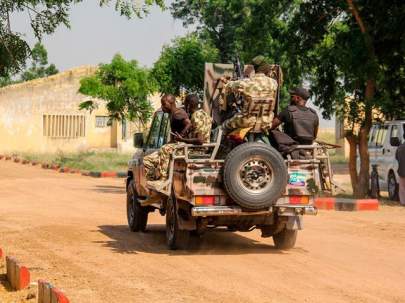Boko Haram Seizes 50 Villages Near Nigerian Capital

Members of the Islamist terror group Boko Haram have forcibly seized at least 50 villages near the Nigerian national capital of Abuja over the past three weeks, the governor of Nigeria’s Niger State said Monday.
“In a brazen attack, 100 kilometers [62 miles] from Nigeria’s capital city, Abuja, Boko Haram terrorists sacked 50 communities in Niger State and hoisted their flag in Kaure village,” Nigeria’s Leadership newspaper reported on April 26. Abuja is part of Nigeria’s federal capital territory, which is located in the center of the country a short distance east of Niger State.
The governor of Niger State, Alhaji Abubakar Sani Bello, confirmed Boko Haram’s recent insurgency near Abuja on Monday while visiting an Internally Displaced Persons (IDP) camp at IBB Primary School in Minna, located 94 miles west of the national capital.
“I am confirming that there are Boko Haram elements around Kaure in [the] Shiroro local government [region] of Niger State,” Bello said. Shiroro is located 40 miles north of Minna.
“They have taken over the territory. They have installed their flag. I am confirming to you now that they have taken over the wives of the people by force,” the governor said, revealing that more than 3,000 people had been displaced by Boko Haram’s regional invasion so far.
Bello said Boko Haram’s recent infiltration of the Kaure area in Shiroro indicated the terror group was attempting to establish a new base closer to the Nigerian national capital, Abuja. Boko Haram has historically been based out of northeastern Nigeria’s Borno State, specifically in and around the state’s Sambisa Forest.
“Sambisa is several kilometers from Abuja but Kaure is just two kilometers from Abuja. So, nobody is safe anymore, not even those in Abuja,” Bello said Monday. Sambisa Forest is located about 530 miles northeast of Abuja.
The governor said he had requested the assistance of Nigeria’s federal government to fight off Boko Haram’s incursion into Niger State over the past month but had failed to receive support, according to the Nigerian news site Sahara Reporters.
“This is what I have been engaging the federal government on, unfortunately, it has now got to this level. If care is not taken, even Abuja is not safe,” Bello told reporters in Minna on April 26. “We have been saying this for long. All our efforts have been in vain.”
Leadership interviewed a man staying at Minna’s IDP camp on April 26 who said he was forced out of the Shiroro town of Kuchi by Boko Haram earlier this month along with all of the community’s residents.
“For three weeks now there is no person living in Kuchi town and there is no food for the fleeing villagers. The bandits have entered very deep into the area and have overrun several villages. They have occupied Kuchi where they now sleep as their homes,” Bulus Esu told the newspaper.
“Two weeks ago, the bandits demanded N5 million [about $13,000] ransom from the people of Kampana to bail themselves from being kidnapped,” Esu said. “The people did this to avoid being kidnapped. However, when they [Boko Haram] came back the next time, they asked the women to cook food for them after which they still raped the women.”
Photo: AUDU MARTE/AFP via Getty Images




